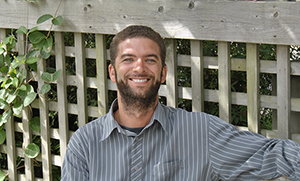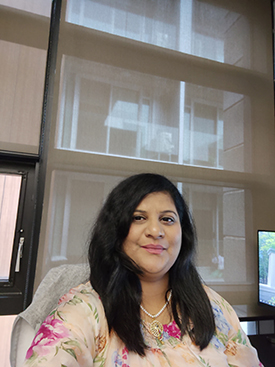Dalhousie’s BIPOC Graduate Student Mentoring Academy, currently in its second year, is opening new doors for Black, Indigenous and People of Colour (BIPOC) graduate students at Dal, offering tailored mentorship opportunities, professional development and networking events dedicated to supporting their aspirations.
Organized by the Faculty of Graduate Studies, along with the support of other Dal Faculties and units, the program is designed to break down barriers caused by systemic racism that limit students from reaching their full potential. It connects grad students of colour with mentors of colour who are experts in their fields and share similar backgrounds.
With this year’s cohort of more than 30 mentees and 20 mentors coming to a close in May, recruitment for the next year is starting soon. Applications open at the beginning of May for the next cohort of mentors and August for mentees.
We caught up with members of the BIPOC Graduate Student Mentoring Academy team for more on the program and their roles within it.
Timothy Bardouille, Program lead
 Timothy Bardouille, an associate professor with the Department of Physics and Atmospheric Science, is the academy’s team lead. The inspiration for the program stemmed from a moment he shared with a graduate student after a Black Lives Matter rally at the Halifax Commons. After discussing ways to continue the momentum after the rally, a support group for Dal students, staff and faculty developing social justice initiatives at the university was born. The BIPOC Mentoring Academy was an idea that grew from that team.
Timothy Bardouille, an associate professor with the Department of Physics and Atmospheric Science, is the academy’s team lead. The inspiration for the program stemmed from a moment he shared with a graduate student after a Black Lives Matter rally at the Halifax Commons. After discussing ways to continue the momentum after the rally, a support group for Dal students, staff and faculty developing social justice initiatives at the university was born. The BIPOC Mentoring Academy was an idea that grew from that team.
Why is this program so important for BIPOC students?
Every student can benefit from mentorship and guidance to develop professionally and to meet their life goals. The problem is that there is massive underrepresentation of BIPOC folks at higher professional levels. BIPOC students are disadvantaged in building mentorship relationships in this environment, due to things like selection bias, implicit (stereotypical) assumptions, and sometimes explicitly racist behaviour. The academy’s major role is to provide an avenue for students to connect with mentors, to ensure that they are getting the opportunities that they deserve.
Describe one opportunity and one challenge that the program faces as it grows — both for mentors and mentees.
One opportunity is to connect with industry partners in the region to recruit mentors from outside the university. Many graduate students see themselves contributing to Canada’s industrial and commercial sectors. These amazing and engaged students have a lot to offer Canada’s economy, and mentorship relationships with folks in industry might be the stepping stone they need.
As with so much social justice work, the biggest challenge is resources. Being a mentor is exceptionally rewarding and looks good on your resume, but it’s also a time commitment, and not everyone has the bandwidth to take it on. We’re trying to find ways to ensure our mentors can leverage their commitment to help their own careers.
Where do you see the program growing?
I think there are graduate students in other equity deserving groups that could benefit from a program like this. Generally, students at the intersection of multiple equity deserving groups (e.g., Black women) experience the most isolation and discrimination. So, mentorship programs that provide a lifeboat for these students are imperative.
Read also: Equity in medical education: Black Health Primer aims to build inclusive health care
Shirin Shaikh, Program coordinator
 As the BIPOC Mentoring Academy’s program coordinator, Shirin Shaikh’s role is to facilitate a supportive environment where Dalhousie’s BIPOC graduate students can thrive academically, personally and professionally. She oversees the recruitment of mentees and mentors, organizes mentorship relations, curates resources, and organizes activities and engagements to address the unique needs and aspirations of BIPOC grad students within the academy.
As the BIPOC Mentoring Academy’s program coordinator, Shirin Shaikh’s role is to facilitate a supportive environment where Dalhousie’s BIPOC graduate students can thrive academically, personally and professionally. She oversees the recruitment of mentees and mentors, organizes mentorship relations, curates resources, and organizes activities and engagements to address the unique needs and aspirations of BIPOC grad students within the academy.
How does this program address the needs and aspirations of BIPOC students?
The program provides culturally sensitive support, offering opportunities for peer-to-peer and mentor-to-mentee networking and skill development specific to participants. We help BIPOC students identify their academic and professional goals and offer learning and mentoring opportunities to aid in achieving them. One of our objectives is to empower BIPOC graduate students to become future mentors.
How does the program encourage active engagement from both mentors and mentees?
We encourage this through regular communication, opportunities for feedback, structured activities, networking events and workshops that foster meaningful connections and mutual learning. Mentors and mentees are encouraged to communicate and meet regularly, preferably at least once a month.
Theresa Afi, Executive committee student representative
 Theresa Afi, a PhD student in Civil Engineering, is the academy’s executive committee student representative. What motivated her to be part of this initiative is an awareness of the challenges BIPOC graduate students face – including feeling isolated, overwhelmed, unheard, and unconfident about their ability to achieve the success they desire. Just as motivating was the realization that this initiative can be a home where they are heard, have community, and where life as a graduate student feels more fulfilling than daunting.
Theresa Afi, a PhD student in Civil Engineering, is the academy’s executive committee student representative. What motivated her to be part of this initiative is an awareness of the challenges BIPOC graduate students face – including feeling isolated, overwhelmed, unheard, and unconfident about their ability to achieve the success they desire. Just as motivating was the realization that this initiative can be a home where they are heard, have community, and where life as a graduate student feels more fulfilling than daunting.
What are the needs of BIPOC students at Dalhousie?
From my daily interactions with BIPOC students, and being one myself, I find that there is a great need for community to build a sense of belonging, reinforce confidence, and be a place to seek help when needed. However, graduate students often juggle multiple responsibilities, leaving behind programs that do not have an obvious or immediate consequence for nonparticipation. As such, I think a greater need of BIPOC students is the ability to refocus. Bringing forward the activities that equip us for graduate study and then approaching our work with direction, structure, authenticity, confidence, and peace. All of which can be achieved through proper guidance.
How are the needs of BIPOC students reflected in the program?
I believe the challenges highlighted earlier could be addressed through mentorship. The program provides a rare opportunity where students come not only to be encouraged, but also to receive guidance academically, career wise and for personal development. It also provides networking opportunities, which help with career advancement and community building.
For more information on the BIPOC Graduate Student Mentoring Academy, visit the Faculty of Graduate Studies’ webpage.

